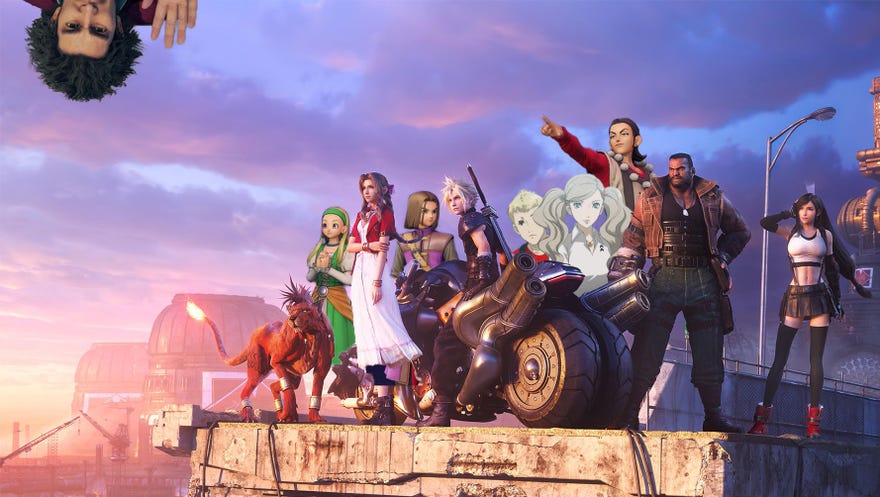The 11 best JRPGs on PC in 2024
The party line
Can you believe we didn't have a best JRPG list until now? Baffling. To be fair we did once tackle this topic with a preliminary blast of recommendations for those completely new to the genre. We also have a few familiar fantasys in our list of the 50 best RPGs on PC. But until now we haven't addressed the genre in its own right. In an act of contrition, we offer you this: our list of the best JRPGs you can play on PC this year, according to our own tastes.
Our interpretation of the JRPG is fairly open-ended. On this list you'll find games not made in Japan, and others that stretch the conventions to fit the modern world, far from the fantasy battlers of yore. But that's okay, even the genre's own label is not beyond interrogation.
In other words, we make up the rules here! And for now those rules go as follows: only one game per franchise. For example, you'll only find one Final Fantasy on the list (what!) despite it being the most dominant name in the genre (besides, we have those covered). Another rule I've decided to follow is not to include the game you love the most. I am sorry. It is number 12.
Remember: if you adore a particular JRPG, and find it absent below, please recommend it in the comments. Pour out your love for it. Hell, pour out your frustration! Cover your fellow commenters in a broad spittle of understanding. We all have something in common here - a love for suplexing trains.
The best JRPGs on PC
Here's our list in short. The links summarised here are in alphabetical order, but the list itself is ranked because we suspect you love the suspense of scrolling to see what's number 1. If you truly can't stand to wait, no worries. Just click a title below to be directed straight to that game.
- Chrono Trigger
- Disgaea 5
- Dragon Quest XI: Echoes Of An Elusive Age
- Final Fantasy VII Remake
- Like A Dragon: Infinite Wealth
- Ni No Kuni 2: Revenant Kingdom
- Octopath Traveler 2
- Persona 5 Royal
- Sea Of Stars
- Tales Of Arise
- Undertale
11. Ni No Kuni II: Revenant Kingdom

You know how it is. One minute you're being chauffeured along the highway as President of your country, reflecting on your many years of civil wisdom, when - BAM! The nuke hits your motorcade and all your particles dissolve across dimensions, seeping into a fantasy realm where you inhabit the body of a dapper, younger version of yourself. Yes, Ni No Kuni II begins with a traditionally daft isekai moment, but soon that whole setup is thrown away in favour of ushering in a new kingdom. It's a colourful mash-up of gamey ingredients: part role-playing game, part city management, part real-time-strategy. The story of Evan, the cat-eared boy king, is ultimately a little forgettable. But the moment-to-moment dialogue is excellently localised, with lots of Geordie and Welsh accents appearing to add variety to the animal folk of its fairytale world.
10. Octopath Traveler 2

Both this and the first Octopath Traveler are equally viable go-to moderno-JRPGs. The gimmick is that you won't be following a single story, but rather eight smaller tales that eventually coalesce into one greater strand. You can start the game as a thief seeking an escape from their oppressive and shadowy crime syndicate. Or as a struggling but gifted dancer who wants to leave their rural hometown and hit the big time in a nearby city. Or a cleric with a touch of Columbo, out to uncover the truth about his own church. In terms of storytelling, there are more captivating entries on this list, but in terms of presentation, battle mechanics, boss fights, and set pieces, it's hard not to recommend to anyone seeking a great-looking example of JRPG revivalism.
9. Tales Of Arise
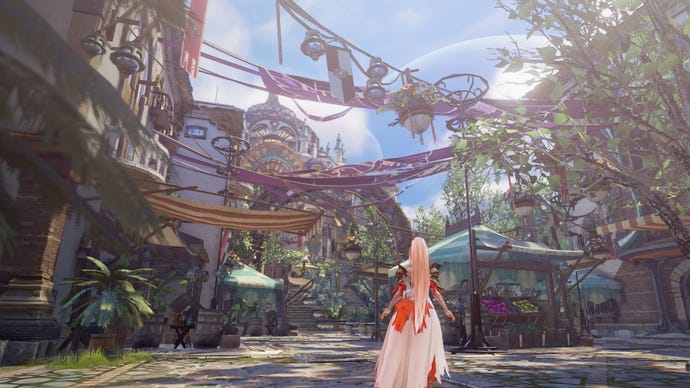
Tales Of games have a habit of starting on the wrong foot. They throw you into their fantasy worlds with brisk and unflattering introductions to their characters and it's usually only after a couple of hours that it dawns on you: oh no, I like this idiot. Tales Of Arise is no exception. One of your heroes is an ancient maiden with a rail gun, a both literally and figuratively thorny person (she has a hereditary curse that covers her body in spikes). The other is a classic do-gooding amnesiac with a sword and a curse of his own - he cannot feel pain. They are both unapproachable dorks. And yet... and yet... Tales Of Arise is simply the best-looking and best-feeling of these slash-first-ask-questions-later misadventures. Its world is more interesting to explore than that of Tales of Beseria, and its character-swapping combo-biffing is more involved than Tales of Vesperia, which makes it a good entry point for anybody desirous of the series' popcorn-munching anime silliness.
8. Disgaea 5
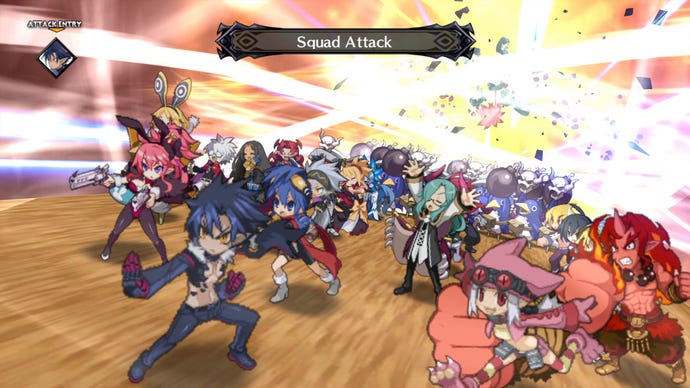
How much do you really care about storytelling in a JRPG? Not much? Good! Here's something for you - a chaotic pick 'n' mix of a turn-based tactics game that has more menus than a Byzantine restaurant. The Disgaea games are known for their labyrinthine and anarchic approach to number crunching and character customising. Partly, this is so you can get a giggle out of the manic joy of getting a character to level 9999, only to reset them to level 1, give them a new class, and do the whole thing again while presumably chewing the inside of your own gums to shreds. There are systems and sub-systems and sub-sub-systems, all of them coalescing into an absurd hub of machinery that eventually just invites you to cheat at the game, because it's funny and it will kill a lot of monsters. Becoming "OP" in Disgaea 5 is only the beginning.
7. Sea Of Stars
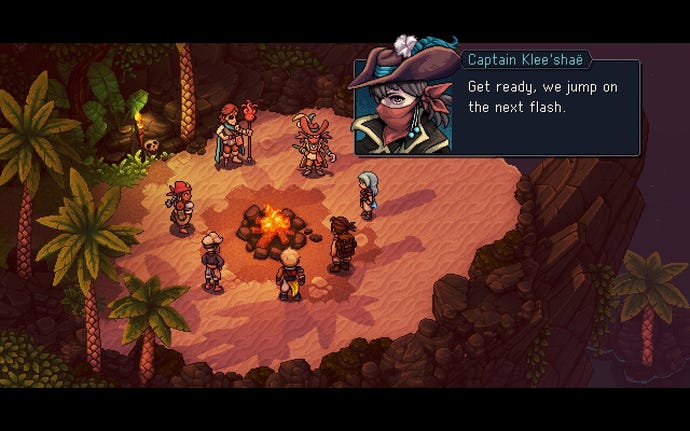
People sometimes use the term "homage" with an implied sneer. As if the artwork that shows its inspirations openly has not earned its own identity. Sea Of Stars is a pleasant reminder that a respectful love for the tropes of a genre can inspire something that happily stands apart. This is a clean, concise, and lip-pursingly handsome pixel art recreation of a JRPG from the era of Chrono Trigger, with many of yesteryear's bugbears surgically removed. There's no grind, for example, no random battles. It is so frictionless even the characters glide gracefully off the walls when they walk too close - a simple touch that will make you realise how clunky and grid-locked those old games often were. This is a JRPG for those who want to venture back to a simpler time, but don't want to surrender the quality-of-life luxuries that modern gaming affords.
6. Dragon Quest XI: Echoes Of An Elusive Age

Some like it slow. The pace of adult life demands that many of us are afraid to invest in a large-scale, long term beast of a JRPG. Especially if it sticks unbendingly to the traditions of turn-taking and tiki-taka levelling up. Yet for anyone with the patience and time to re-establish the peaceful days of trekking over thundering landscapes in Final Fantasy X, or exploring every possible side story in Chrono Trigger, this current generation game is perfect. Dragon Quest is something of a tentpole in the genre, and the PC has been neglected when it comes to this staunchly conservative series of fantasy walkabout. But now you can see what all the fuss is about. Take your time. The rest of these games aren't going anywhere.
5. Undertale
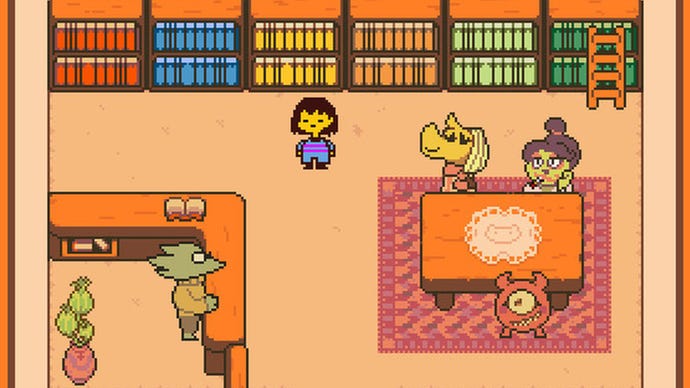
An old-school RPG with a weird Simpsons-looking dweeb as the protagonist has no right to be this moving. But it is. Undertale is about a human child who grows up around monsters. It is like Where The Wild Things Are, if that children's book grew pixels, told a joke, and then punched you in the gut while you were laughing. Some might nitpick and complain that Undertale doesn't count as a JRPG, but that seems unfair when you observe how much jestering love it shows the genre. It has a deep understanding of JRPG rhythm and tone, from the musically memorable way it introduces its friends and foes, to its whimsical battle menus. It is dense with gags. There are laugh-out-loud ones, little wry smilers, punchy bark-provokers, snorters, guffaw-eliciters, nose-exhalers, every small subset of human comedy (and tragicomedy) is covered in the 10 hours or so it'll take you to get through the story. This is a game full of humour and feeling, and it understands equally the foibles and fun of JRPG games like a child understands and forgives the overbearing quirks of a loving mum.
4. Chrono Trigger
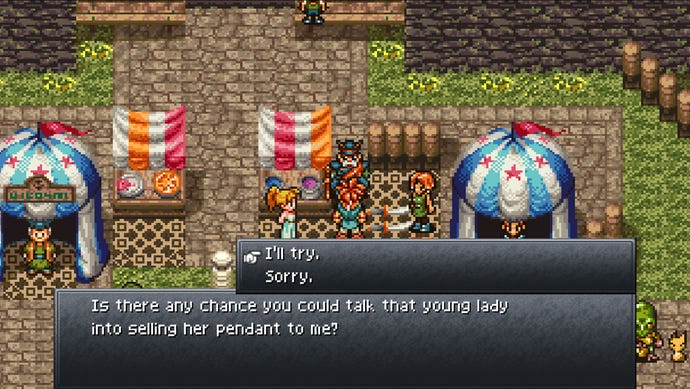
Chrono Trigger is a monster of influence. By today's standards it looks like a familiar piece of work - a (mostly) turn-based battler with rich pixel art and a party of characters out to save the world. But if Chrono Trigger looks by-the-numbers, that is because it invented the numbers. It at least set a bunch of precedents embraced today by so many JRPGS (not to mention other genres). It had branching storylines and multiple endings long before it became normal. It popularised the New Game + feature, granting players the ability to run through the game again with all your stats and powers carrying over into a fresh playthrough. It hid a huge amount of its most emotionally powerful storytelling in sidequests and non-essential areas. Modern games often don't have the confidence to pull off this last trick. But it's one of the reasons a love for Chrono Trigger still reverberates among JRPG fans today. To those who explore every nook and cranny of time itself, it feels like a personal journey. Also, its music is good enough to warp the mind of a master pianist.
3. Final Fantasy VII: Remake
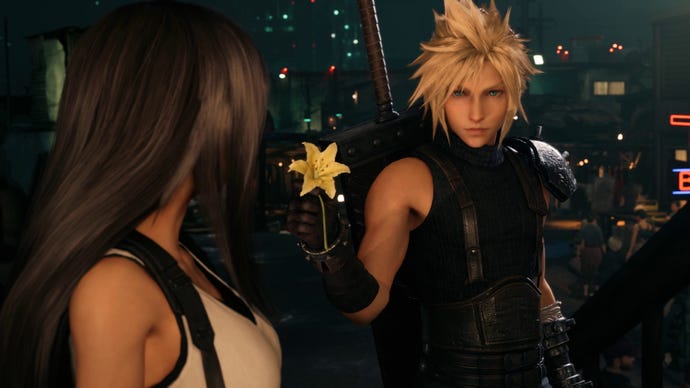
A conundrum: do we recommend the blocky and time-honoured Final Fantasy VII of 1997, or the flashy and significantly altered Remake of 2020? To recommend the former is to stick to conventional wisdom. To recommend the latter is to introduce a new conventional wisdom with better graphics. Either way, we are going to upset everyone on planet earth. I've decided to go with the modern Remake, since it allows us to embrace both recency bias and our rose-tinted glasses at the same time. Remarkable! The story of Cloud Strife and his merry band of environmentalist freedom fighters is probably one of the most written-about tales in video game history. Here we're seeing that tale adapted and built-upon, morphing in sometimes unpredictable ways. The re-telling of a story long carved in immovable JRPG stone. In many ways, Final Fantasy VII is a story about loss, and Square Enix are threatening to upend that bucket of grief into a pool of safe and fizzy nostalgia. This alone makes the ongoing modernisation of Cloud's strife worth following. In 1997, gamers were forced to process the loss of a character to the point of acceptance. Over twenty years later, we are being handed a chance to dive head-first back into denial. That's kinda neat!
2. Like A Dragon: Infinite Wealth
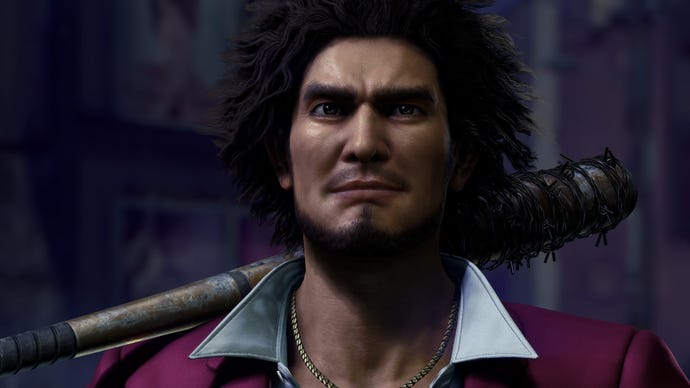
With Yakuza: Life A Dragon the series not only shifted focus from its beloved protagonist Kiryu Kazuma, it also dove off the bridge of third-person fighting and into the crashing waves of turn-based battling. Loyal Yakuza likers will probably want to faithfully play that first off-shoot to establish themselves in the wacky world of Ichiban Kasuga, but this Hawaii-bound sequel is the better instalment. It pushes the new role-play systems in the right direction, smoothing out any growing pains that emerged in the studio's transition to full JRPG. And it doesn't shy away from the absurdity that the series has become well-known for. You can debuff enemies by spritzing them with perfume. You can level up legally-distinct Pokémon in a fully-realised side game. You can join a dating app and embarrass yourself by getting badly cat-fished. And in the midst of all this silliness, you will find yourself caring about yet more criminally adjacent doofuses.
1. Persona 5 Royal
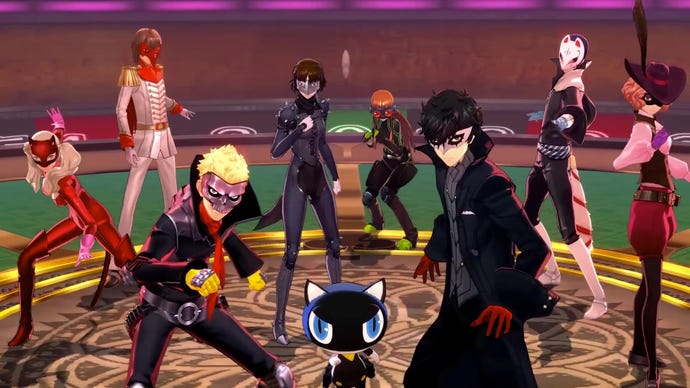
Much of Persona 5 is spent battering the psychological manifestation of a sleazeball's lust, or delving into a subterranean traumaworld to help the beleaguered citizens of a deeply unwell Tokyo. But between the turn-based battles lies the game's real heart. You go to school, you eat fast food with your friends, you go shopping with that girl you like, you drink coffee with your foster dad, you go see a fortune teller for kicks, you cram for end-of-term exams, you dodge chalk thrown by impatient teachers, you do pull-ups in the attic while a talking cat shouts at you... Persona 5 is a happy holiday into a slightly warped reality. For those who click with it, the game can last over 100 hours, each day of scholastic life piling up to become an entire year of hijinks, head invasions, and hastily eaten buffet food. It's a nostalgic visitation to the best days of your life. Although, now that I think about it, I never two-timed my teacher with the disgraced doctor from down the street who experiments on teenagers. But that's probably just me, very sheltered.
There you have it. Our favourite JRPGs lying out in the sun, ready for you to come and stomp upon them with the grumpy dignity of a Final Fantasy fan denied satisfaction. I understand! But have no fear. The beauty of the internet is that this article doesn't end now. It just keeps going in the comments. Tell us your favourite JRPG, and more importantly, tell us why you love it.
